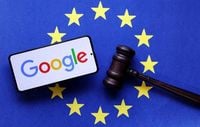The European Union took a bold step against major tech firms on March 20, 2025, by accusing Google of violating its digital rules and ordering Apple to enhance compatibility for rival devices. This move, part of the EU's ongoing efforts under the Digital Markets Act (DMA), comes amid increasing tensions with the United States over tech regulations.
On March 19, the EU's actions against Google were centered around two significant charges: the company allegedly restricted app developers from advertising better offers outside of Google Play and provided preferential treatment to its own services within its search engine. The EU has indicated that if Google is found guilty, it might face fines of up to 10% of its annual sales—a potentially staggering penalty considering its vast revenues.
Meanwhile, Apple faces two direct orders to adjust its lucrative ecosystem. The EU has mandated that Apple open up its platform to allow for seamless interoperability with competitors' devices, specifically smartphones, headphones, and virtual reality headsets. The first of these charges surfaced six months into the EU's investigation, aiming to dismantle Apple's tight grip on its ecosystem.
This latest action from the EU's competition watchdog is not just a regulatory effort; it is escalating an already fraught relationship with the U.S., particularly with President Donald Trump, who has vocally criticized the EU's approach to American businesses. Trump has previously warned of retaliation against any fines imposed on U.S. companies, threatening tariffs as leverage.
The European Commission's findings have been interpreted by analysts as both a warning to the tech giants and a signal of the EU's commitment to enforcing stricter tech regulations. This enforcement is crucial for their design to establish a level playing field within the digital market, a concern that has only heightened in recent years with the growing influence of companies like Google and Apple.
Teresa Ribera, the EU's antitrust chief, stated, “These measures ensure that Alphabet abides by EU rules when it comes to two services widely used by businesses and consumers across the EU, Google Search and Android phones.” Such statements underscore the EU's goal to break monopolistic practices and foster fair competition.
Google has not taken the accusations lightly, stating that EU competition rules could harm consumers. Oliver Bethell, Google’s senior director for competition, expressed concerns, saying, “The Commission's findings require us to make even more changes to how we show certain types of Search results, which would make it harder for people to find what they are looking for and reduce traffic to European businesses.”
Apple, on its part, voiced its apprehension, highlighting that the EU's directives could hinder innovation and ultimately harm users. A spokesperson for Apple conveyed that “Today's decisions wrap us in red tape, slowing down Apple's ability to innovate for users in Europe and forcing us to give away our new features for free to companies who don't have to play by the same rules.”
The stakes are high, not just for the companies involved, but for the EU itself as it sets a precedent for regulating powerful tech firms globally. The actions taken on March 20 are just the latest in a series of moves aimed at reshaping the digital marketplace, a task that will likely require ongoing dialogues between EU regulators and tech giants.
After the announcement, shares of both Google and Apple saw increases, with Alphabet's shares climbing 1% and Apple’s shares up by 1.6%, indicating investor optimism despite the regulatory challenges ahead.
This showdown between the EU and tech companies is evolving, with both sides entrenched in their positions. While the EU reaffirms its commitment to uphold competitive practices within its market, tech companies are pushing back against regulation they view as overly restrictive and damaging to innovation.
As the situation develops, the outcomes of these penalties and orders could influence not only the companies involved but also shape the future of tech regulation both in Europe and across the globe. As more details emerge, stakeholders from the tech industry and consumers alike will be closely watching how these regulatory frameworks unfold in the coming months.
In this critical moment, the EU demonstrates its resolve not only to protect its market but also to establish a norm that could ripple throughout the tech industry worldwide, making it clear that compliance is not optional in an increasingly competitive landscape.


